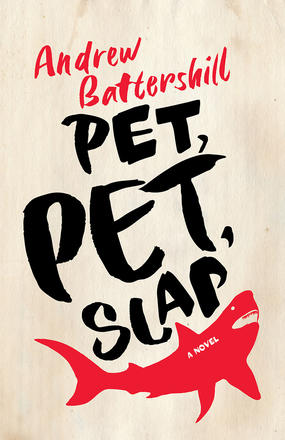‘A game is afoot’
Pet, Pet, Slap
by Andrew Battershill
Toronto: Coach House Books, 2024
$23.95 / 9781552454763
Reviewed by Logan Macnair
*

Before one reads Andrew Battershill’s new novel Pet, Pet, Slap, it is worth mentioning that this book serves as a prequel to Battershill’s 2016 Scotiabank Giller Prize longlisted novel Pillow, and while those unfamiliar with that book (which I myself have admittedly not yet read) may miss out on the occasional wink or reference, it is by no means required reading to understand or enjoy the comedic misadventures of a younger ‘Pillow’ Wilson.
Ostensibly the narrative of Pet, Pet, Slap is framed around the well-worn trope of an ageing, past-his-prime boxer preparing for what could very well be his last significant fight against a younger, fitter opponent that no one expects him to beat. And while this title bout and Pillow’s preparation for it hang over every chapter, the main narrative thrust comes from the various escapades that Pillow becomes enmeshed in via his exposure to and interactions with the book’s bizarre and entertaining cast of characters.
Battershill’s cast starts with ‘Pillow Fist’ Pete Wilson himself, “the lightest-hitting boxer in the world,” who serves as the book’s protagonist and acts as the reader’s window into the strange and surreal world of professional boxing that he inhabits.
Pillow, while perhaps rendered a little dim after a decade of taking punches to the head, is certainly not stupid, and what he may lack in social graces or ‘conventional’ intelligence he makes up for with his instinctual and poignant insights and musings regarding the nature of competition, preparation, focus, and fighting. He has an endearing affection for animals (particularly exotics) and often acts as if he were a giant puppy dog himself, constantly bouncing around, crawling, and licking or kissing the bodies of those around him.
And despite the wider world seeming unconvinced of his ability to win his looming fight, Pillow remains unwavering in his conviction as to the outcome, never a doubt in his mind as to how it would end. His confidence remains high even as mine as the reader dropped as I read on about his many instances of botched training, his sketchy drug regimen, his increasingly eccentric behaviour and interactions with the press, and his side odysseys with friend and roommate Sherlock Holmes.
Speaking of, the Sherlock Holmes character does not just have a coincidental literary moniker, but is indeed pulled straight from the pages of Arthur Conan Doyle’s famous detective stories, albeit with some more modern tendencies. In addition to solving mysteries via his preternatural deductive reasoning skills, for instance, the Sherlock Holmes of this story also operates as Pillow’s roommate and personal chemist, responsible not only for concocting the drugs needed to give Pillow a competitive edge, but for manipulating his biochemistry in such a way that will allow him to beat any drug tests he might have to take.
The experiment of placing famous literary characters and artistic figures (from the twentieth-century Surrealist movement in particular) into the here and now is one that features heavily throughout Pet, Pet, Slap. For instance, the character of Violet Hunter (responsible for some the most entertaining dialogue exchanges in the book), who enlists the services of Sherlock (and Pillow by association), is borrowed directly from Doyle’s short story “The Adventure of the Copper Beeches,” and the events that follow are lifted almost beat-for-beat from that story.
Rounding out the cast of characters are Pillow’s foul-mouthed, no-nonsense trainer Kim Lion, ageing female crime boss Gwynn Apollinaire, and various other figures plucked straight from the surrealist film movement (Jean Painlevé) or the pages of French crime fiction (Arsène Lupin).

Following these notable artistic and literary personalities as they anachronistically engage and interact with the modern world certainly leads to some charming situations and humorous exchanges. Readers lacking familiarity with the figures of the Surrealist art movement or the literature that Battershill references and pulls from may not fully appreciate or be ‘in’ on the joke or understand why these characters speak or act the way that they do. That shouldn’t prevent them from enjoying the strangeness of it all at face value.
These characters and their eccentricities would fit right in with the cast of a film by the Coen brothers (with a similar noirish-inspired plot to boot) and can likely be enjoyed that way without any prior knowledge of their namesakes.
In the hands of a less capable writer this unlikely and erratic combination of literary and stock characters and genre tropes from detective, noir, and underdog sports stories would likely prove too complex to navigate and depict with any sense of cohesion. Fortunately, Battershill (Marry, Bang, Kill) demonstrates the skill required to weave these various strands together in a compelling and compulsively readable way.
His chapters are short and punchy, his dialogue witty, and his prose is peppered with creative and oddly engrossing metaphors, similes, and descriptions that result in a unique and entertaining narrative voice. Some emblematic standouts that I took note of:
Pillow had been sitting in a chair as expensive as a liver transplant for what felt like the length of a liver transplant.
Pillow found himself staring out the window of a train that moved as smoothly as a piece of Styrofoam on the surface of a dying river.
Sherlock looked about as enthused as a fresh grape meeting a raisin.
It is a writing style that calls to mind the comedic surrealism of John Swartzwelder (particularly, his Frank Burly series of time-travel detective novels).
The novel indeed climaxes with Pillow’s title fight, which serves as the loose backdrop for the entire story and, without getting into specific plot details, it is a set piece that is unique not only in its length (being the book’s longest chapter by quite a margin) but in how it displays Battershill’s ability to write action sequences that are as punchy and dynamic as his dialogue and descriptions.
I found myself wanting a bit more in the way of a post-fight denouement than the brief one Battershill provides (as I wasn’t quite ready to leave these characters so abruptly), but I suppose that is enough incentive for me to finally check out 2016’s Pillow and to cause me to wonder if Battershill himself is done with this character or with this weird and wonderful little world he has created.
[Editor’s note: Join Andrew Battershill in conversation with Zsuzsi Gartner on Wednesday, June 5, 7-8pm, Vancouver Central Library.]
*

Logan Macnair is a novelist and college instructor based in Burnaby. His academic research is primarily focused on the online narrative, recruitment, and propaganda campaigns of various political extremist movements. His second novel Troll (Now Or Never Publishing, 2023) is a fictionalized account based on his many years of studying online extremist groups. [Editor’s note: Jessica Poon reviewed Troll in BRC. Logan Macnair reviewed Kate Black, Kawika Guillermo, and James Hoggan with Grania Litwin for BCR.]
*
The British Columbia Review
Interim Editors, 2023-25: Trevor Marc Hughes (non-fiction), Brett Josef Grubisic (fiction and poetry)
Publisher: Richard Mackie
Formerly The Ormsby Review, The British Columbia Review is an online book review and journal service for BC writers and readers. The Advisory Board now consists of Jean Barman, Wade Davis, Robin Fisher, Barry Gough, Hugh Johnston, Kathy Mezei, Patricia Roy, Maria Tippett, and Graeme Wynn. Provincial Government Patron (since September 2018): Creative BC. Honorary Patron: Yosef Wosk. Scholarly Patron: SFU Graduate Liberal Studies. The British Columbia Review was founded in 2016 by Richard Mackie and Alan Twigg.
“Only connect.” – E.M. Forster
One comment on “‘A game is afoot’”